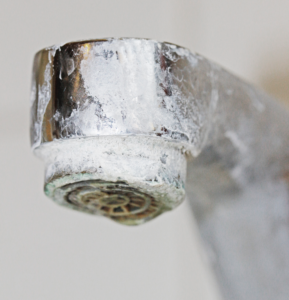
Are you curious as to the detrimental effects of calcium and magnesium in water? Read on. We’re going to discuss them below.
Causes Mineral Buildup on Pipes
One of the biggest problems you’ll encounter with calcium and magnesium in water is that it causes mineral buildup on the interior walls of water pipes. While this happens gradually over years and years of use, it can eventually render your pipes useless.
First, mineral buildup will cause the water pressure to drop. Then, if not tended to, it will result in a complete restriction of water. This is, obviously, not something you’ll want to deal with.
Want to prevent mineral buildup in your pipes? The solution is easy: do away with the calcium and magnesium in your water by installing a water softener.
Leaves Behind Limescale
Have you ever seen a metal sink or water fixture with white powder on it? If so, you were likely seeing limescale buildup, which is a small layer of sediment consisting of calcium and magnesium particles.
Limescale buildup happens over time due to the existence of calcium and magnesium in water. Once this water evaporates, the calcium and magnesium within it remain, piling up slowly.
Though limescale buildup doesn’t cause any functional problems, it can drastically reduce the aesthetic of a water fixture. Therefore, if you want to keep your fixtures spick and span, a water softener will assist you greatly.
Puts Wear and Tear on Appliances
Another way in which calcium and magnesium are a detriment to your water is the effect that they have on your water appliances.
Over time, as dishwashers, refrigerators, and other appliances are forced to deal with calcium and magnesium, their internal mechanisms experience wear and tear. This wear and tear not only reduces the lifespan of these appliances, but it also makes them less efficient.
Conversely, when these appliances aren’t forced to deal with calcium and magnesium, they are able to run smoothly, prolonging their lifespan and optimizing their efficiency. In essence, if you want to get the most out of your water appliances, it’s important to soften your home’s water.
Negative Effects on the Skin and Hair
Not only do calcium and magnesium wreak havoc on your possessions, but on your body itself. Your skin and your hair, in particular, are highly vulnerable to these minerals, as they can clog pores and prevent the secretion of necessary oils.
Those who use hard water are more prone to eczema, acne, split ends, and other such issues. If you already suffer from these issues, hard water is bound to exacerbate them.
In the end, if you want to keep your skin and hair as healthy as possible, it’s wise to install a water softener. A water softener will eliminate calcium and magnesium, allowing your body to secrete oils as needed.
Use a Water Softening Company in Batavia, Illinois
Looking to do away with the negative effects of calcium and magnesium in your water? Hoping to make use of water softening in Batavia, Illinois? If so, we here at DuPage Water Conditioning are the people to see.
Our team of dedicated, skilled, and experienced water softening and water purification specialists has installed water softeners in a variety of homes throughout Batavia and its surrounding areas. We can have the calcium and magnesium removed from your water supply in no time.
Contact us today for a free estimate!
